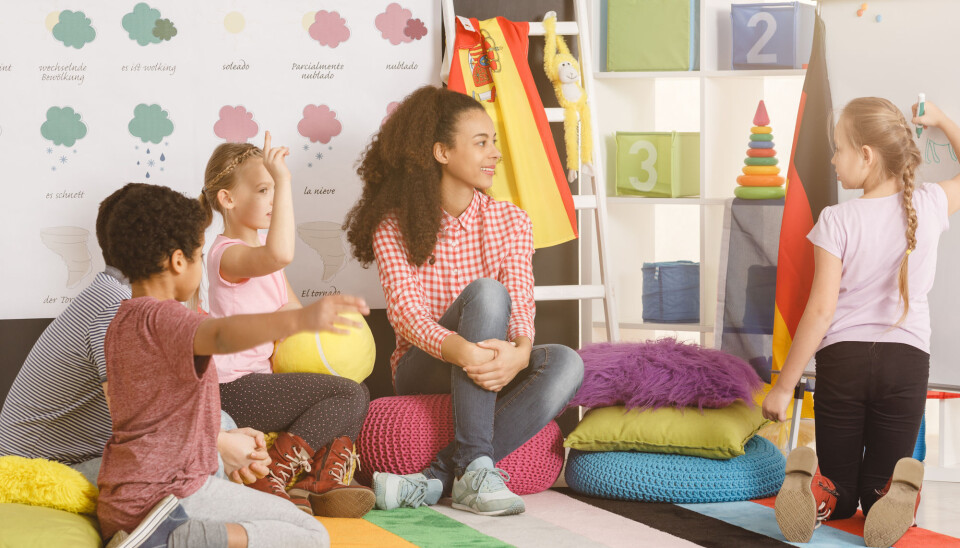THIS ARTICLE/PRESS RELEASE IS PAID FOR AND PRESENTED BY University of Stavanger - read more

Being bilingual does not make you smarter
A large-scale study counters the belief that speaking two or more languages gives children a cognitive advantage.
It has long been claimed that bilingual children have an advantage when it comes to cognitive processing skills. However, a new, large study shows that this is not the case.
“There is no doubt that knowing several languages is an advantage in life. Language gives you the opportunity to communicate with people, access to other cultures and texts, and in the modern worklife, being multilingual can have huge benefits. However, when it comes to cognitive processing skills, there are no differences between monolingual and bilingual children,” says associate professor Hilde Lowell Gunnerud by the Reading Centre, University of Stavanger.

A dominant theory
For many, this may come as a surprise. The message has been convincing for years, as seen in this headline from the New York Times: Why bilingualism makes you smarter!
Researchers and journalists have long told us that the ability to switch between two or more languages, has other benefits for the brain. The idea has been that children who speak two languages, constantly direct their attention towards the language they use then and there. One has thought that this effort also exercises other parts of the brain, and that bilingual children therefore train up their working memory, attention, planning, the ability to suppress irrelevant information, and switching between activities.
This theory also claims that how well developed this cognitive advantage is, depends on their bilingual language experiences. Children who use both languages frequently, over several years, have been thought to have a higher advantage.
More children are bilingual
Although this has been a dominant theory, the actual research into bilingualism has had varying results. While some studies have shown convincing evidence that bilingual learners have superior and cognitive processing skills, other studies have shown little or no difference between monolingual and bilingual children.
An increased number of children are growing up with two or more languages. Teachers and special education officers need to know what is considered normal development for bilingual children.
“We need to know what is considered normal in order to identify difficulties in children, so that we can provide necessary support for those who need it,” Gunnerud says.
40 years of research
Gunnerud and her colleagues compared findings from 100 studies investigating differences between monolingual and bilingual children, from the 1980s to 2017. This led to an investigation of 143 comparisons and 583 effect sizes, and the conclusion is clear:
While there are isolated studies that show an advantage related to the cognitive processing skills in bilingual children, the overall result is that there are no meaningful differences between monolingual and bilingual children, neither when looking at cognitive processing skills as a whole, nor for most of the subcomponents (working memory, attention etc).
The study was recently published in Psychological Bulletin. A recent study of adults has similar findings.
Compares several studies across different contexts
Sometimes meta-analyses are criticised for comparing studies that cannot be compared due to their different analytical focus or examinations of different samples and contexts. This is not so much of a problem in the current meta- analysis.
“Since this study includes a large number of primary studies, we have been able to investigate many of the dominant hypothesis addressed in the primary studies, however with more statistical strength. This has allowed us to look into whether methodology or characteristics in the groups of children in the various studies may explain some of the differences. However, we could not find support for the idea that the bilingual groups who one may have thought have particularly strong advantages, performed better than their monolingual. Our findings are solid,” says Gunnerud.
“There might of course be advantages – or disadvantages – to being bilingual that we aren’t aware of. However, the theories we have operated with to date do not correspond with our findings.”
Certain differences
Although this study overall rejects the theory that bilingual makes you “smarter”, some of their findings raised the researchers’ curiosity. One is that it appears as if certain groups of bilingual children seems to be better at switching between activities.
“However, we cannot explain why this is the case for some, while other bilingual children actually have a weaker performance than children who speak one language,” says Gunnerud.
Another finding that intrigued the research group, is that a particular research environment in Canada consistently found a higher degree of advantages in multilingual children, than what is the case for other studies. The researchers are also curious as to why bilingual children from middle class backgrounds seem to have an advantage in cognitive processing, whilst this was not the case for bilingual children from working class nor upper class families. “The dominate theories regarding SES class and a bilingual advantage in cognitive processing cannot explain this outcome,” Gunnerud says.
In other words, there is still a lot of research that needs to be done.
The problem with publication bias
How can it be, then, that a theory that proves to be false, has gained so much attention? There might be several explanations, however one reason might be publication bias: studies showing negative or no effect, are put in a drawer and never published. A consequence can be that the published research gives a false impression of reality.
“We see tendencies that studies showing advantages for bilingual children are more often published than studies showing little or no difference,” says professor Monica Melby Lervåg from the University of Oslo, who is one of the researchers behind the meta-analysis.
In this case, it looked as if bilingual children were somewhat better in supressing irrelevant stimuli, and in adapting their level of attention according to different tasks. “However, these findings were affected by publication bias, so we have to ask whether there are any real differences here,” Gunnerud says.
Speaking several languages is still an advantage
Although the study shows that bilingualism does not make you “smarter”, Gunnerud stresses that speaking more than one language is an advantage.
“There are definitely benefits to learning more than one language well,” she says.
The most important consequence of this study, according to Gunnerud, is that those working with bilingual children will know more about what to expect from this group.
“There are a lot of myths and misconceptions around. In particular, there has been a lack of knowledge on what is considered normal development for different groups of bilingual children. Several children who speak more than one language, have been misdiagnosed with difficulties. Others have gone under the radar because their difficulties have not been identified.”
“Without knowing what is considered normal development, it is not possible to identify abnormal development. These findings are important when we are to identify which bilingual children who are in need help and support,” she says.
References:
Hilde Lowell Gunnerud et.al.: Is bilingualism related to a cognitive advantage in children? A systematic review and meta-analysis. Psychological Bulletin, 2020.
Minna Lehtonen et.al.: Is bilingualism associated with enhanced executive functioning in adults? A meta-analytic review, Psychological Bulletin, 2018. (Summary)
———
Read the Norwegian version of this article at forskning.no
Related articles
-
How the Vikings protected themselves from attacks
-
Like tuning forks in space: A final pure tone reveals the mysterious interior of neutron stars
-
Could scented books encourage more kids to read?
-
Artificial intelligence could improve the quality of life for more patients following a stroke
-
Cathedral's lost treasures uncovered
-
Norwegian researchers can contribute to changing the Big Bang theory





































